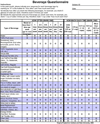The beverage intake questionnaire: determining initial validity and reliability
- PMID: 20656099
- PMCID: PMC2911642
- DOI: 10.1016/j.jada.2010.05.005
The beverage intake questionnaire: determining initial validity and reliability
Abstract
Consuming energy-containing beverages may lead to weight gain, yet research investigating this issue is limited. An easily administered beverage intake assessment tool could facilitate research on this topic. The purpose of this cross-sectional investigation was to determine the validity and reliability of a self-administered beverage intake questionnaire (BEVQ) that estimates mean daily intake of beverages consumed across 19 beverage categories. Participants (N=105; aged 39+/-2 years) underwent assessments of height, weight, body mass index, and dietary intake using 4-day food intake records from June 2008 to June 2009. The BEVQ was completed at two additional visits (BEVQ1, BEVQ2). Urine samples were collected to objectively determine total fluid intake and encourage accurate self-reporting. Validity was assessed by comparing BEVQ1 with food intake record results; reliability was assessed by comparing BEVQ1 and BEVQ2. Analyses included descriptive statistics, bivariate correlations, paired samples t tests, and independent samples t tests. Self-reported water and total beverage intake (in grams) were not different between the BEVQ1 and food intake records (mean difference 129+/-77 g [P=0.096] and 61+/-106 g [P=0.567], respectively). Total beverage and sugar-sweetened beverage energy intake were significantly different, although mean differences were small (63 and 44 kcal, respectively). Daily consumption (in grams) of water (r=0.53), total beverages (r=0.46), and sugar-sweetened beverages (r=0.49) determined by the BEVQ1 were correlated with reported intake determined by the food intake record, as was energy from total beverages (r=0.61) and sugar-sweetened beverages (r=0.59) (all P values <0.001). Reliability was demonstrated, with correlations (P<0.001) detected between BEVQ1 and BEVQ2 results. The BEVQ is a valid, reliable, and rapid self-administered dietary assessment tool.
2010 American Dietetic Association. Published by Elsevier Inc. All rights reserved.
Figures
Similar articles
-
Evaluation of the Relative Validity and Test-Retest Reliability of a 15-Item Beverage Intake Questionnaire in Children and Adolescents.J Acad Nutr Diet. 2017 Nov;117(11):1757-1766.e5. doi: 10.1016/j.jand.2017.05.011. Epub 2017 Jun 30. J Acad Nutr Diet. 2017. PMID: 28673606
-
Development of a brief questionnaire to assess habitual beverage intake (BEVQ-15): sugar-sweetened beverages and total beverage energy intake.J Acad Nutr Diet. 2012 Jun;112(6):840-9. doi: 10.1016/j.jand.2012.01.023. J Acad Nutr Diet. 2012. PMID: 22709811 Free PMC article.
-
Assessing Initial Validity and Reliability of a Beverage Intake Questionnaire in Hispanic Preschool-Aged Children.J Acad Nutr Diet. 2016 Dec;116(12):1951-1960. doi: 10.1016/j.jand.2016.06.376. Epub 2016 Aug 21. J Acad Nutr Diet. 2016. PMID: 27554270
-
Assessment of beverage intake and hydration status.Nutr Hosp. 2015 Feb 26;31 Suppl 3:62-9. doi: 10.3305/nh.2015.31.sup3.8753. Nutr Hosp. 2015. PMID: 25719773 Review.
-
A systematic review of measurement methods used to estimate fluid and beverage intake in free-living, working-age adults.J Hum Nutr Diet. 2023 Aug;36(4):1368-1389. doi: 10.1111/jhn.13127. Epub 2023 Jan 8. J Hum Nutr Diet. 2023. PMID: 36514191 Review.
Cited by
-
Water Intake and Hydration Indices in Healthy European Adults: The European Hydration Research Study (EHRS).Nutrients. 2016 Apr 6;8(4):204. doi: 10.3390/nu8040204. Nutrients. 2016. PMID: 27058557 Free PMC article.
-
Farmers' market shopping and dietary behaviours among Supplemental Nutrition Assistance Program participants.Public Health Nutr. 2015 Sep;18(13):2407-14. doi: 10.1017/S1368980015001111. Epub 2015 Apr 21. Public Health Nutr. 2015. PMID: 25895894 Free PMC article. Review.
-
Evaluation of a novel biomarker of added sugar intake (δ 13C) compared with self-reported added sugar intake and the Healthy Eating Index-2010 in a community-based, rural U.S. sample.Public Health Nutr. 2016 Feb;19(3):429-36. doi: 10.1017/S136898001500107X. Epub 2015 Apr 23. Public Health Nutr. 2016. PMID: 25901966 Free PMC article.
-
Longitudinal Patterns of Beverage Intake in Treatment-Seeking Children with Obesity in Eastern NC Using the Validated BEVQ-15.Nutrients. 2023 Sep 27;15(19):4171. doi: 10.3390/nu15194171. Nutrients. 2023. PMID: 37836455 Free PMC article.
-
Changes in the Healthy Beverage Index in Response to an Intervention _targeting a Reduction in Sugar-Sweetened Beverage Consumption as Compared to an Intervention _targeting Improvements in Physical Activity: Results from the Talking Health Trial.Nutrients. 2015 Dec 4;7(12):10168-78. doi: 10.3390/nu7125525. Nutrients. 2015. PMID: 26690208 Free PMC article. Clinical Trial.
References
-
- Hensrud DD, Klein S. Extreme obesity: A new medical crisis in the United States. Mayo Clinic Proc. 2006;81:S5–S10. - PubMed
-
- Ogden C, Carroll M, Curtin L, McDowell M, Tabak C, Flegal K. Prevalence of overweight and obesity in the United States, 1999–2004. JAMA. 2006;295:1549–1555. - PubMed
-
- Hedley A, Ogden C, Johnson C, Carroll M, Curtin L, Flegal K. Prevalence of overweight and obesity among US children, adolescents, and adults, 1999–2002. JAMA. 2004;291:2847–2850. - PubMed
-
- DiMeglio D, Mattes R. Liquid versus solid carbohydrate: Effects on food intake and body weight. Int J Obes Relat Metab Disord. 2000;27:794. - PubMed
Publication types
MeSH terms
Substances
Grants and funding
LinkOut - more resources
Full Text Sources


